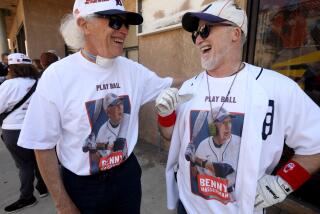ALS Still Incurable, Deadly
- Share via
NEW YORK — Lou Gehrig gave a face -- and a name -- to Amyotrophic Lateral Sclerosis, the disease that claimed his life on June 6, 1941, and today remains an incurable killer of thousands of people each year.
Gehrig was 6-foot and 200 pounds. He played in a record 2,130 consecutive games for the New York Yankees and was known as the Iron Horse. Yet, all his strength could not fight off the ravages of ALS, more commonly known as Lou Gehrig’s Disease.
ALS is a disease of the skeletal muscular motor nerve cells throughout the nervous system. The disease generally affects both the upper motor neuron, those nerves leading from the brain to the medulla or to the spinal cord, and the lower motor neurons, those neurons leading from the spinal cord to the muscles of the body.
People with ALS die because the ability of the brian to start and control muscle movement dies with them. With all voluntary muscle action affected, those afflicted eventually become totally paralyzed, although the mind remains unaffected.
Lou Gehrig began having trouble making routine plays in the spring of 1939. He had trouble cathing the ball, his timing at-bat was off and his usual effortless glide to first base to take a throw was replaced by a stumble.
Approximately one-third of the patients with ALS notice the disease onset because the hands become clumsy and there is difficulty in executing tasks such as sewing or holding tools.
Another third have weakness in the legs because of a mild foot drop and the other 33 percent may have slurred speech and difficulty swallowing.
In honor of Gehrig’s memory, baseball has dedicated this June as Lou Gehrig Month and will conduct Lou Gehrig Days at stadiums throughout the month. The first will be June 2 at Veterans Stadium in Philadelphia.
The dedications will culminate with a special Lou Gehrig Day at Yankee Stadium on July 4, 50 years to the day that Gehrig made an emotional farewell speech.
“Lou Gehrig epitomized excellence through strength, durability and courage,” Commissioner A. Bartlett Giammatti said. “Major League Baseball is very pleased to take part in the effort to find a cure for the disease that took his life.”
ALS has also touched the lives of several current players, including George Brett of Kansas City and Kent Hrbek of Minnesota.
Brett developed his interest in ALS through his friendship with Keith Worthington, a vice president of a Kansas City department store.
After Worthington was diagnosed with ALS, Brett worked with him to begin awareness of ALS and aid in research efforts. Just before Worthington’s death, Brett promised his friend he would continue the fight against the disease.
“These are very special people,” Brett said. “There bodies are affected but their minds are still strong.”
Brett and Hrbek have joined with Cleveland’s Pete O’Brien as co-chair of the First Baseman’s Honor Committee composed of first baseman from throughout the major leagues.
Hrbek’s father died of ALS.
“Whenever I play at Yankee Stadium it’s very special,” Hrbek said. “I’m a first baseman and playing in the same spot where Lou Gehrig played is something.”
Since Gehrig’s death, millions of dollars has been raised to research ALS, but the cause of the disease is still not known nor any specific enzymatic defect identified. The search for drug therapy has depended upon effects known in the treatment of similar diseases.
There have been some important findings recently that may lead to a cure.
Researchers have found decreased levels of RNA in the neurons of patients with ALS.
It is estimated that ALS is responsible for one out of every thousand deaths in people over the age of 20. Gehrig died at 37.
When he said his farewell on July 4, 1939, Gehrig knew he may not live long.
“Fans, for the past two weeks you have been reading about the bad break I got,” Gehrig said. “Yet today I consider myself the luckiest man on the face of the earth. I have been in the ball parks for 17 years, and have never received anything but kindness and encouragement from you fans.”
Brett sees that kindness in his work with ALS association.
“It’s been a very important part of my life,” Brett said.






